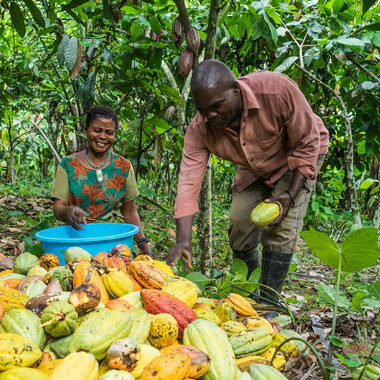Congolese Cocoa
Posted by Theo Chocolate on Feb 22nd 2017
Theo began purchasing cocoa from the Democratic Republic of Congo in 2010.
Flavor profile: nutty, brown fruit
Average per year: 70% of Theo supply
Farmers: 4,686
Family members supported: 32,802
Why Congo, Why Cocoa, Why Now?
The Democratic Republic of Congo (DRC) is rich in natural and human resources but it has the lowest per-capita gross domestic product in the world. During the past twenty years, violence, poverty, disease, and war have claimed the lives of over 6 million Congolese men, women, and children. And despite democratic elections and multiple peace agreements, the eastern region is still impacted by conflict, which has significantly diminished the availability of reliable, income-generating employment, as well as education and health care.
In 2010, Theo, along with ECI and ESCO, recognized an opportunity to help the region emerge from crisis by joining forces with local farmers to cultivate cocoa. Cocoa requires minimal re-planting, prevents deforestation, and can be sold for much higher value than other local food crops. It is also considered “militia-proof” because its true value isn’t realized until it’s processed. Our first contract in 2010 was for just twenty tons and it was a struggle to buy from farmers. Today Congolese cocoa represents 70% of Theo’s total cocoa supply and can be found in every single chocolate product that we make.
Over the years, we’ve invested our time, resources, and hearts in the DRC and the relationships we have cultivated there.
On the Ground:
ESCO Kivu is our export partner and was the first buyer of smallholder cocoa in Eastern Congo. With ESCO, Theo supports cocoa farmers through provision of low-cost planting materials, farmer training, and of course, direct purchasing. ESCO has facilitated over 4,500 farmers receiving their Organic and Fair Trade Fair for Life certifications. These farmers commit themselves to meeting rigorous sustainability standards and good agricultural practices along with annual farm audits.
Eastern Congo Initiative (ECI) is an advocacy and grant-making initiative wholly focused on working with and for the people of eastern Congo. ECI envisions an eastern Congo vibrant with abundant opportunities for economic and social development, where a robust civil society can flourish. ECI believes that local, community-based approaches are essential to creating a sustainable and successful society in eastern Congo. Working together with Theo since 2010, ECI has supported local organizations to develop initiatives that benefit cocoa farmers.
In 2015, Theo supported a maternal health initiative which educates women in cocoa-farming communities on the benefits of regular pre and post-natal check-ups and of giving birth in a hospital. After just one year, the program has thus far contributed to the elimination of maternal and newborn deaths in these health zones, bringing the figure from 45 maternal and childhood deaths annually to zero. In addition,
- 4,500 cocoa families have learned about family planning
- 665 families have saved money for health-care costs
- 60 children were born in hospitals
- Use of post-natal health services increased by 50%
The Impact of Your Theo Chocolate Bar Purchase
Theo’s business in DRC goes beyond the sense of opportunity and excitement we feel when visiting cocoa farmers and has had proven impact:
- Theo has increased area market prices for farmers. Prices where we source are $260 more per ton than a nearby cocoa region
- New job opportunities that extend beyond farming – 142 full time employees at ESCO working in non-agricultural, middle class jobs such as management
- 4,536 farmers have been trained in good agricultural practices that protect the environment and improve farmer income
- Young people are staying in cocoa farming because they see it as a viable career
- More families are sending their children to schools because they’re now able to afford the fees. Some farmers are even sending their children to better schools that are farther away and require boarding costs.
Cocoa farming is also the primary reason people have come back into this area of Congo during conflict. People have confidence that ESCO and Theo will keep buying their cocoa during periods of unrest.
At one point, cocoa farmers were sleeping in the safety of Uganda and crossing the border to care for their cocoa farms during the day. This demonstrates the power the opportunity of cocoa has had in DRC.
In a country with at least 2 million internally displaced persons, this is no small feat. Some of the increased stability that has been achieved also relates to housing, where there have been considerable gains since Theo started. Between 2012 and 2015, farmers created an association named Tujengeane which means ‘let’s build together.’ They pooled their income from cocoa to purchase metal roofing sheets and build a house in local thatch materials for a farmer. After building the house, they would move on to the next member. This group enabled families to get re-established after many lost their houses during the war. Just this year, farmers created a new association and are now using cocoa income to build houses together using bricks instead of thatch.

